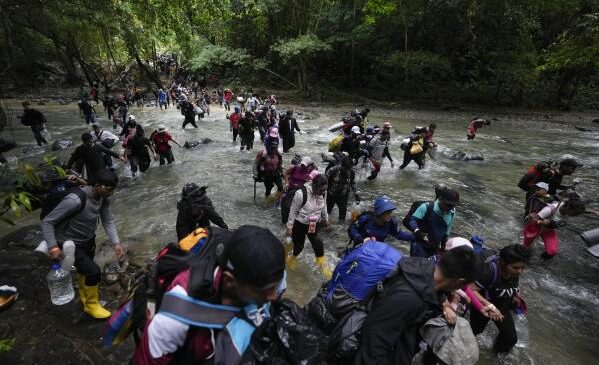
Over the last year, over half a million people have crossed the Darién Gap on their journey north, often to the United States, fleeing human rights crises in the Americas, including violence and persecution, and escaping poverty. Venezuelans, Haitians, and Ecuadorians, along with people from other regions like Asia and Africa, risk their lives in this difficult terrain. Since January 2022, over 440,000 Venezuelans have crossed the Darién Gap, the largest number for any nationality. They are fleeing an ongoing humanitarian emergency in their country, which has undermined access to food and medicine, as well as abuses and persecution by security forces, armed groups, and gangs.
During their days-long walk across the gap, migrants and asylum seekers of all nationalities frequently experience robbery and serious abuses, including sexual violence and on the Colombian side of the Darién Gap, the Gulf Clan, an armed group involved in drug trafficking, regulates the routes that migrants and asylum seekers can use, decides who can assist them on the way, extorts people who benefit from migrant flows, and establishes rules of conduct for locals and migrants alike, at times enforcing these rules through violence. The Colombian military estimates that the Clan collects, on average, US$125 per person crossing the Darién Gap. If the estimate is accurate, the armed group may have made a total of US$57 million between January and October 2023 from its control over this migration route.
Criminals and bandits prey upon migrants and asylum seekers as they cross the many routes through the jungle, especially on the Panamanian side. People are routinely robbed, sexually abused, and at times raped. Médecins Sans Frontières (MSF or Doctors without Borders) has assisted 950 people, most of them women, who reported sexual violence crossing the Darién Gap since April 2021. In May 2022, armed men ambushed a group of migrants, including a 22-year-old Haitian woman travelling with her husband and 1-year-old son. The men separated her and two other women from the group. One man shoved her against a tree and sexually assaulted her, she said. A second man joined in the assault, asking her where the money was. She pointed to her boots. They took all the money she had stored there and let her go.
Governments in the Americas should implement rights-respecting immigration policies that build on the Los Angeles Declaration on Migration and Protection, signed by 21 states in 2022. They should seize the upcoming 40th anniversary of the 1984 Cartagena Declaration, a landmark international instrument on refugees’ rights in Latin America, to respond to the increasing migration challenges in the region. Governments should also take steps toward creating an equitable and rights-focused regional mechanism to determine the responsibility of countries to examine asylum claims and protect refugees, considering individual factors, like social or family ties and individual choices, to the extent possible. “Whether fleeing persecution or seeking economic opportunities, migrants and asylum seekers deserve safe and dignified ways to move,” Goebertus said. “They are all entitled to basic safety and respect for their human rights during their journey.”
